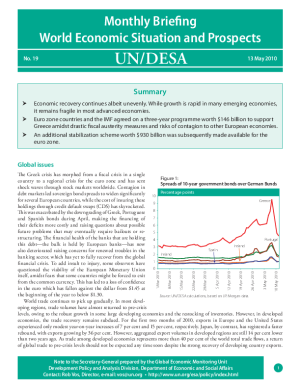May 2010
Summary:
- Economic recovery continues albeit unevenly. While growth is rapid in many emerging economies, it remains fragile in most advanced economies
- Euro zone countries and the IMF agreed on a three-year programme worth $146 billion to support?Greece amidst drastic fiscal austerity measures and risks of contagion to other European economies
- An additional stabilization scheme worth $930 billion was subsequently made available for the euro zone
The Greek crisis has morphed from a fiscal crisis in a single?country to a regional crisis for the euro zone and has sent?shock waves through stock markets worldwide. Contagion in?debt markets led sovereign bond spreads to widen significantly?for several European countries, while the cost of insuring these?holdings through credit default swaps (CDS) has skyrocketed. This was exacerbated by the downgrading of Greek, Portuguese and Spanish bonds?during April, making the financing of?their deficits more costly and raising questions about possible?future problems that may eventually require bailouts or restructuring. The financial health of the banks that are holding?this debt?the bulk is held by European banks?has now?also deteriorated raising concerns for renewed troubles in the?banking sector, which has yet to fully recover from the global?financial crisis. To add insult to injury, some observers have?questioned the viability of the European Monetary Union?itself, amidst fears that some countries might be forced to exit?from the common currency. This has led to a loss of confidence?in the euro which has fallen against the dollar from $1.45 at?the beginning of the year to below $1.30.
?
Download the World Economic Situation and Prospects Monthly Briefing No. 19
 Welcome to the United Nations
Welcome to the United Nations
